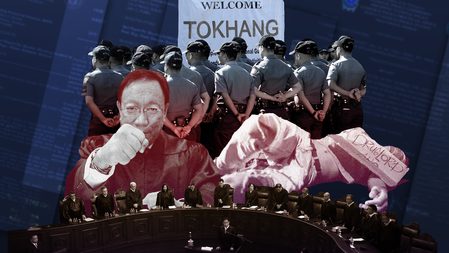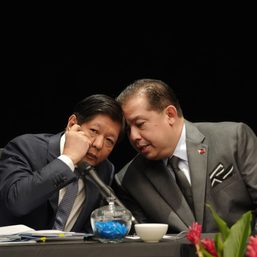SUMMARY
This is AI generated summarization, which may have errors. For context, always refer to the full article.

The House of Representatives drug war accountability inquiry has so far only scratched the surface of Rodrigo Duterte’s bloody war on drugs, but for victims of the war, any inquiry is better than none.
“Hindi naman 100% [naiibsan ang takot], pero ang paglaban sa hustisya medyo may kaunting kagalakan kasi hanggang sa panahon ngayon, hope lang, hanggang may panawagan (My fear has not diminished 100%, but in the fight for justice, we are a little bit positive at this time, we just hope for as long as we still have some calls),” said Christine Pascual after the hearing on Wednesday, June 5.
Pascual’s son, 17-year-old Joshua Laxamana, was a gaming champion who was in Baguio for a dota tournament with friends in August 2018. Laxamana was killed by local police of Rosales, Pangasinan, in another case of “nanlaban” or suspects allegedly fighting back. Laxamana is one of the 7,884 (police only concede 6,000) alleged suspects who were killed by police in anti-drug operations.
But Laxamana’s killers were not present in the first or the second hearing of the inquiry, conducted by the House committee on human rights chaired by Manila 6th District Representative Benny Abante. Instead, the committee invited to Wednesday’s hearing past and present leaders of the Philippine National Police (PNP) and 28 other cops with links to Duterte in varying capacities, for example Sonny Buenaventura, whom whistleblower Edgar Matobato had identified as playing a key role in the Davao Death Squad (DDS).
Of the 28, only Colonel Lito Patay showed up. A significant chunk of the seven-hour hearing on Wednesday was spent grilling Patay, who was reassigned from Davao del Norte to Quezon City when Duterte became president. When he took command of Quezon City Station 6, local cops recorded a high number of kills, earning them a story on the foreign news wire Reuters that tagged them “a secretive police squad.”
However, even the interpellation of Patay did not yield anything substantial. Abante and Sta. Rosa City, Laguna Representative Dan Fernandez were more fixated on cross-checking the Reuters report, and at one point badgering Reuters’ former Philippine correspondent, Manny Mogato, to reveal the sources of their Pulitzer prize-winning investigation that revealed cash rewards for police to kill and stage crime scenes.
When Mogato refused, as he is protected by the Sotto law to keep journalistic sources confidential, Fernandez said: “We know your responsibility as a journalist, but you also have a responsibility to these victims, hindi ka ba naaawa sa mga biktima natin (do you not take pity on these victims)? By revealing your source, you will be solving a lot of problems, and I think it is incumbent upon the journalist that there’s this kind of selfless act on behalf of the victims.”
“Hangga’t hindi mo sinasabi, hindi mo kami mabobola, hindi ka namin paniniwalaan (Unless you can’t tell us, you cannot fool us, we won’t believe you),” said Fernandez. Mogato did not budge, and started to tell Fernandez that: “It’s up to you to believe it, we have done our job,” but he was cut.
Targeting the policy
The lawmakers then moved on to grill Patay on the raid that killed four alleged drug suspects in Payatas in 2017, but which Efren Murillo survived by playing dead. The raid conducted by Patay’s team made headlines from 2017 until Murillo was himself acquitted of direct assault in 2023.
ACT-Teachers partylist Representative France Castro grilled Patay if there was any inquest done on his men, but Patay could not immediately provide details. Castro, and fellow Makabayan lawmaker, Kabataan partylist Representative Raoul Manuel pursued the inquest line because they wanted to prove that the system broke down during the drug war. Law enforcement manuals provide that when someone dies in an operation, there is no presumption of regularity, and the case should be brought immediately for inquest to investigate why a death occurred.
Manuel told Rappler after the hearing that he seeks to look into the “written and unwritten rules of Rodrigo Duterte’s drug war…and the responsibilities of top orchestrators of the whole drug war, including former PNP chief Senator Ronald ‘Bato’ dela Rosa.”
Abang Lingkod partylist Representative Joseph Stephen Paduano pursued a line of questioning about the original Oplan Tokhang circular, signed by Dela Rosa in 2016, and asked former PNP chief Oscar Albayalde if they ever made amendments to the circular after seeing that killings were happening in the operations. “As far as I remember, there were no amendments,” said Albayalde.
“I find it so…that they’re doing monthly assessments and the killings during that time was happening, and still hindi man lang na-amend (this was not amended),” said Paduano.
The current PNP leadership later clarified that since 2022 they have been following a new circular called Anti-Illegal Drugs Operation thru Reinforcement and Education or ADORE.
ADORE’s language is more tempered than Dela Rosa’s 2016 circular and acknowledges that there is a “perceived failure of the PNP’s legal battle against drugs such as procedural irregularities, planting of evidence/fabrication of case, failure to attend court hearings, inconsistent testimonies, and failure of the prosecution to present evidence due to an illegal search warrant served or an illegal search and seizure.”
ADORE was signed on April 12, 2022 by former PNP chief Dionardo Carlos, who was Duterte’s second to the last police chief. The last was Vicente Danao who was OIC of the police force before President Ferdinand Marcos Jr. took office.
The committee is keen to make sure Danao attends the next hearing. Danao was Duterte’s local police chief in Davao City. The International Criminal Court (ICC) investigation covers not only the killings in the drug war, but also the alleged killings of the Davao Death Squad during Duterte’s time as mayor.
“We will be inviting the former police officers ‘yun bang inaakala namin (whom we think) were actually involved, mabababa, including sa nagbibigay ng command (lower-ranked up to those who give commands), that’s why General Danao is invited,” Abante told Rappler after the hearing.
The PNP said some in the initial list of 28 were retired or AWOL. Abante said the House will get from the PNP the status of the 28, whether they were still active on duty, retired, resigned, or AWOL.
“We want to know what would make them go AWOL,” Abante said during the hearing.
The committee will also invite the other “Davao boys” or those who were transferred to Metro Manila with Patay when Duterte became president.
How sincere is the hearing?
The elephant in the room is whether this inquiry is a sincere effort to find justice for victims, or if it is a Duterte inquiry, whether that’s to target him or to spare him. Abante said Duterte and Dela Rosa would just be “informed” of the hearing, but not invited out of respect and in consideration of parliamentary courtesy.
Former Act Teachers Partylist representative Antonio Tinio, who is closely monitoring the hearing with the Makabayan bloc, said “it’s no coincidence that before the recess, the House initiated a number of hearings on several issues involving the Duterte administration.”
“Clearly this is happening because of the open and worsening rift in the Marcos-Duterte coalition,” said Tinio. Still, he said, this inquiry is significant if only because this is the first time for it to happen. “This was impossible when Duterte was still in office. Victims’ families are being given a venue to share their stories and demand justice.”
Kristina Conti, an ICC-accredited assistant to counsel and lawyer to a group of victims, said: “We don’t put all our eggs in one basket, [but] we’re putting some of our eggs here.”
Low points
The first half of Wednesday’s hearing was spent badgering the human rights community. Abante told victims that “it’s preposterous” to be afraid to speak up, told them to “stop rallying,” dared Patay to sue a journalist for libel, and then told human rights lawyer Chel Diokno it was civil society’s responsibility to seek justice.

“It is your job, because this becomes your passion, and therefore because it is your passion, you ought to convince these clients, it is your job as a Filipino,” said Abante.
Diokno disagreed profusely. “I cannot force clients to file a case. If I were to convince a client to file a case against the former president, and something happens to that client, who will have the responsibility, it is me, that is why under the law, it is the client’s decision,” said Diokno, chairperson of the Free Legal Assistance Group (FLAG).
FLAG has handled cases of drug war killings, and had filed one of the two petitions to the still pending case at the Supreme Court, seeking to declare the drug war unconstitutional.
“Hopefully the human rights committee can be more sensitive to their plight, moving forward,” said Tinio.
Many times in the hearing the lawmakers fixated on things already widely known to the human rights community, as well as the media who has covered the war for six years.
At one point, when Diokno mentioned there is a 2018 Supreme Court resolution that puts on record the 20,322 deaths in the drug war up until that point, the lawmakers scrambled for the source of the figure, and began asking about the Supreme Court petition that the media has covered since 2017.
The source for the figure is a 2017 public accomplishment report of the Duterte-time Presidential Communications Office (PCO). Yet Abante, Fernandez, and Paduano kept asking former executive secretary Salvador Medialdea to authenticate it. Medialdea kept invoking executive privilege, even though the report was announced publicly, uploaded on the internet, and covered extensively by the media then.
What’s new, what’s next?
The only two new things discovered during the hearings were:
- That in the hyped drug war reinvestigation of 52 cases of killings by police, 30 have now been closed due to lack of evidence.
- That the PNP was no longer following Dela Rosa’s 2016 circular.
“In reality, what was exposed was that the police do not know their policies. They’re saying different things, that Tokhang has different documents, and not everybody knows about all these documents. What’s still prevalent is what Congressman Raoul [Manuel] said: that all of these happened because Duterte said I will finish drugs in six months, so for many of the policemen, they hold on to that, that verbal policy that reverberates,” Conti said.
“I still hope that future proceedings will convince fellow committee members, or even the House leadership, to see the need to formally invite [Dela Rosa],” Manuel told Rappler.
By the end of Wednesday’s hearing, Castro manifested that the committee is also inviting Robert Domingo, the station commander of Manila Police District (MPD) Raxabago Station 1 that was found to be behind a secret cell. In a Rappler investigation of a Manila vigilante group, killers implicated Domingo in what they said were police’s outsourced killings.
The next hearing has been scheduled on June 26. – Rappler.com
Add a comment
How does this make you feel?













![[The Slingshot] Lito Patay’s 4 hours and 38 minutes of infamy](https://www.rappler.com/tachyon/2024/07/Lito-Patay-4-hours-infamy-July-19-2024.jpg?resize=257%2C257&crop=233px%2C0px%2C720px%2C720px)
![[OPINION] Rodrigo Duterte and his ‘unconditional love’ for China](https://www.rappler.com/tachyon/2024/04/rodrigo-duterte-xi-jinping-august-2019.jpeg?resize=257%2C257&crop=91px%2C0px%2C900px%2C900px)


There are no comments yet. Add your comment to start the conversation.